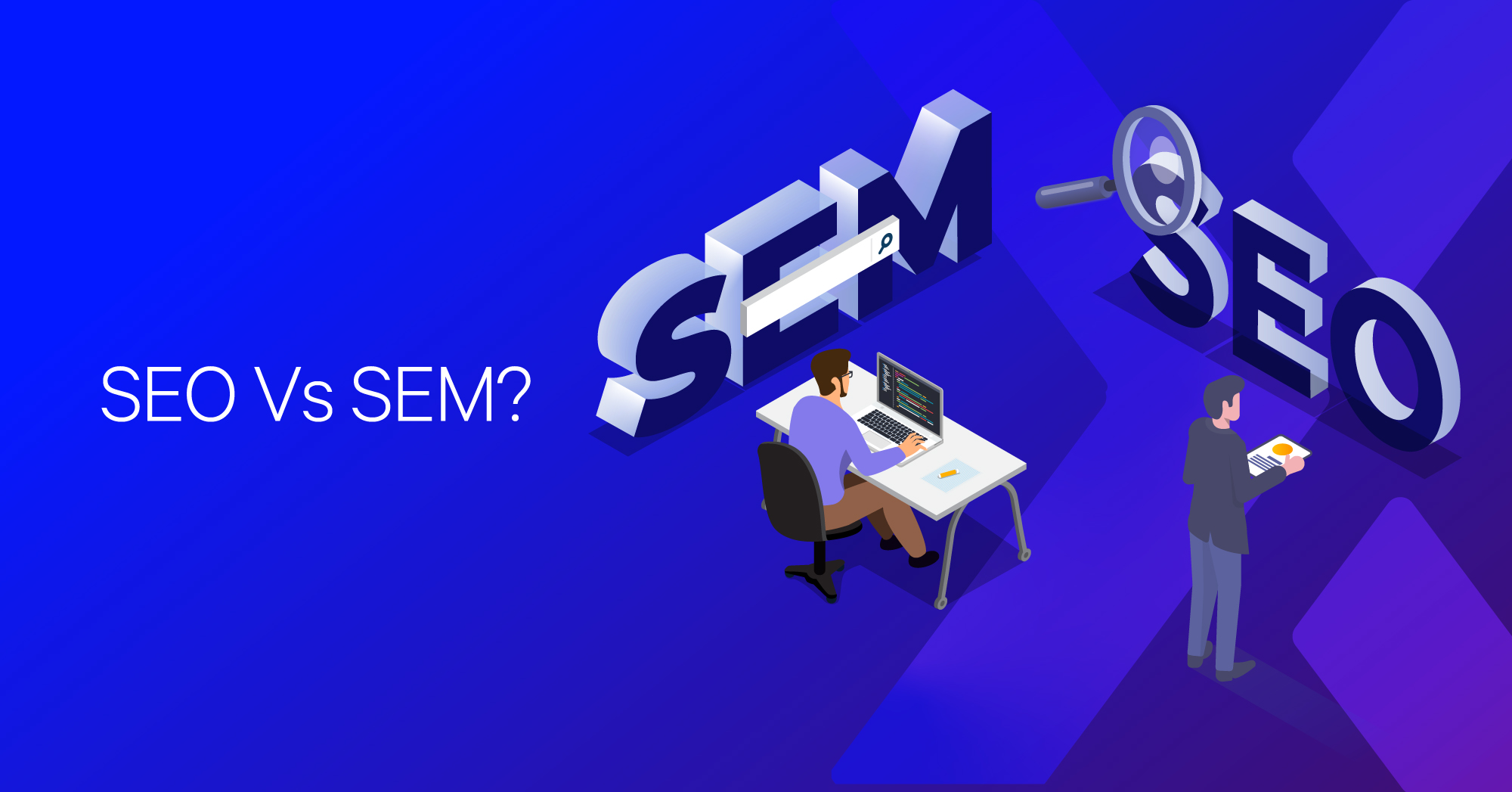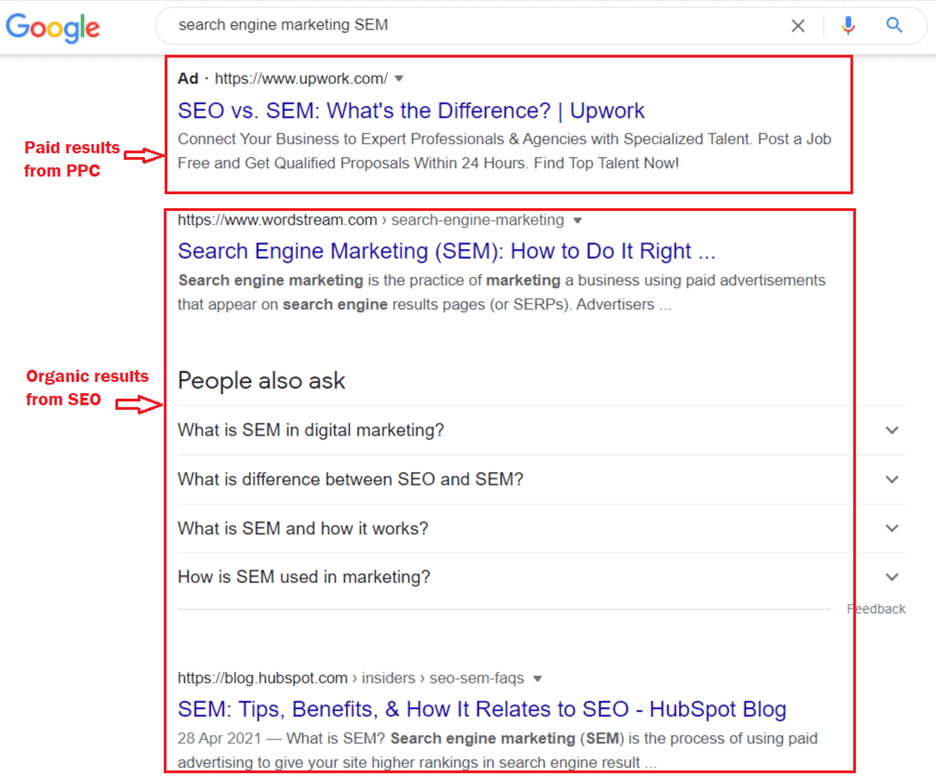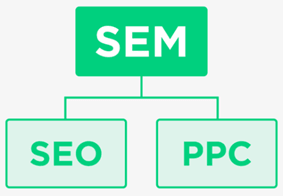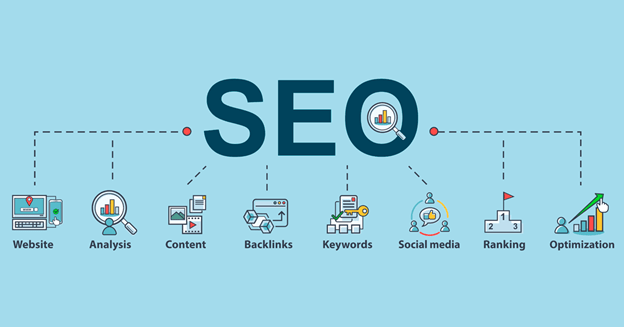SEO Vs SEM?

Hand off the toughest tasks in SEO, PPC, and content without compromising quality
Explore ServicesHaving your business rank on the top page of Google and other search engines means you will attract exponentially more website traffic than your competitors.
Achieving these coveted first-page listings on the search engine results pages (SERPs) is done with search engine marketing – SEM.
But hold on – isn’t SEO (search engine optimization) the process of getting higher ranks in Google?
Well, yes, SEO marketing is one way of getting organic traffic to your website through better search engine rankings. But SEO is just one aspect of search engine marketing (SEM).
Search engine marketing is a broad term that means marketing your website on search engines. Search engine optimization, or SEO, is one of two subcategories of SEM – the other being pay-per-click (PPC) advertising.
But what is the difference between SEO vs SEM? How do they differ, which is the best option for your business, and how do you know which to choose?
We answer these exact questions in this article.
SEO Vs SEM
The difference between SEO and SEM is that SEO is focused on getting traffic to your website only from organic search results. SEM aims to get traffic from both organic and paid search results.
When you search for something in Google, you’ll notice two main result categories: paid search results and organic search results.
These results appear in the order that they do because of PPC (pay-per-click) and SEO (search engine optimization), respectively.

Results from a Google search are divided into 2 categories: paid and organic search results
SEO is the practice of only ranking in the organic search results. SEM is where you leverage both SEO and PPC to get ranked in both the paid and organic search results.
So, search engine marketing (SEM) is the broader term that relates to both SEO and PPC.

SEO and PPC are subcategories of SEM source
Let’s take a look at each term separately.
What is SEO?
SEO stands for search engine optimization.
It is the practice of creating a website that satisfies search engine’s algorithms to get high SERP ranks and drive traffic to the website.

SEO includes many different facets, as shown above source
One of the most coveted spots on a Google search engine results page is the rich snippet, which is a part of a website that Google presents to users that directly answers their question.

A rich snippet from Loganix answering search queries about SEO packages
There are many different elements that go into optimizing a website for organic search, divided into three main categories:
- On-site SEO
- Also known as on-page SEO
- Doing keyword research and competitor analysis
- Creating and publishing high-quality content
- Using internal links to help your user navigate your website
- Having an engaging and aesthetically pleasing web design for an optimum user experience
- Off-page SEO
- Growing the backlink profile of your website with link building
- Increasing the number of high-quality inbound links to your website
- Technical SEO
- Hosting your website on a reliable, stable server
- Encrypting your website to protect user information
- Optimizing page load and site speed
- Optimizing a web page’s meta descriptions and title tags
The beauty of a purely SEO-focused marketing strategy is that it is a long-term investment in the business that can give valuable financial results over an extended period of time.
Once you create a high-functioning SEO website, you have an asset that will continue to generate revenue for years. Monitoring your website’s performance with SEO key performance indicators (KPIs) is the best way to get the most out of your website continually.
Smaller businesses within less competitive niches can benefit very well from SEO marketing alone and might not need to use the far more expensive pay-per-click digital marketing strategy component of SEM. As a smaller business, creating an SEO roadmap is a very effective way of strategizing and executing your SEO strategy for maximum profitability.
What is SEM?
SEM, an abbreviation of search engine marketing, is the umbrella term that means to advertise an online business or website through search engines.
As we’ve mentioned, SEM encompasses SEO but also includes PPC, or paid ads, as an extra component of an online marketing campaign.
When you leverage SEM strategy in its entirety, you not only create SEO material to attract organic traffic to your website, but you also use paid ads to list your business at the top of the search engine results pages.
SEM involves:
- Bing, Yahoo and Google ads
- Google adwords
- PPC ads and search ads
- Ad copy
- Ad campaigns
This has the benefit of driving traffic to your website in the short term and can be very useful once you have established a solid website with good click-through rates and conversion rates.
However, PPC advertising is extremely costly and does not guarantee more purchases. It does mean that your website will get more visitors, but for each time someone clicks on your paid advertisement, you owe Google somewhere in the vicinity of $1.
Moreover, suppose your website isn’t fully optimized for user experience and conversions. In that case, the extra traffic can actually harm your website – as if people arrive on your website then leave straight away (they bounce), or they stay for a short period of time (short session duration), this hurts your organic search ranking metrics.
So if you’re going to invest in SEM, it’s best you have already got a high-functioning, high-converting website.
SEO Vs SEM: What Are The Differences?
SEO and SEM are different in that SEO is 100% focused on organic traffic, and SEM is a blend of SEO and PPC advertising.
SEO doesn’t involve paying any search engines for spaces on their designated advertising space at the top of web pages. Instead, it is solely focused on the website as an asset itself, and optimizing everything about the website for performance in search engine results pages.
On the other hand, SEM includes SEO and all that it entails, with the added element of creating an effective paid advertising or PPC campaign.
There are, of course, many similarities between SEO and SEM. These include:
- The ultimate goal of driving more web traffic to a website
- Leveraging specific keywords, search queries and search terms to target a specific audience
- Creating words and phrases that resonate with the target audience and encourage them towards profitable action
- Require an in-depth understanding of search engine algorithms, user intent, SEO strategy, content marketing, and tracking campaign performance
SEO vs SEM FAQ
Is SEO a part of SEM?
Yes, that is precisely what SEO is. SEM (search engine marketing) is the umbrella term under which SEO (search engine optimization) falls. While SEM focuses on both paid ad campaigns and organic search engine traffic, SEO only focuses on capturing web traffic organically.
Is Paid Search SEO or SEM?
Paid search is part of SEM. Search engines present two different types of results – paid search results and organic search results.
SEO excludes any paid advertising and only focuses on creating a website that attracts organic traffic.
On the other hand, paid search is a digital marketing strategy that online marketers use to capture a greater volume of website traffic in a shorter amount of time by paying Google, Bing, Yahoo, and other search engines to list their website at the top of the page.
Is SEO paid?
While SEO aims to attract free organic traffic, investing in SEO does take money.
It’s best to consider SEO like building a very attractive building for your hotel. When people see your hotel and hear about it, they want to stay there. You don’t pay them to walk through your hotel’s door. However, it costs you an up-front investment to build your hotel and your reputation.
This is very similar to SEO. With an SEO marketing strategy, you pay SEO professionals to build your website so that your target audience can find it, hear about it, and want to visit it. Then, once your website is SEO optimized and running smoothly, you don’t need to put any more money into running it (other than to keep improving its’ performance).
Is SEO better than Google ads?
There is no single answer to this question because the effectiveness of either a paid Google ads campaign compared to an SEO campaign depends on the website, the business, and both can be used concurrently to maximum effect.
In most cases, businesses should first invest in their website’s SEO health and content, before using Google ads.
This is because, with Google ads, you can attract traffic to your website simply by ranking at the top of the search engines. However, if your website doesn’t offer your web traffic any value, they will immediately click off your website and go somewhere else. This is incredibly detrimental to your website’s ranking metrics and brand reputation.
So, without having adequately invested in SEO first, Google ads are harmful. However, suppose you’ve invested in SEO and want to see faster results from your SEO campaign. In that case, spending some money on Google ads can get you a rapid injection of organic web traffic and boost your ranking metrics.
Summary
Hopefully, this article has given you a better understanding of SEO vs SEM.
It’s important to know that SEM is the overarching practise of making a business rank well in all aspects of a search engine’s results pages – both paid results and organic results.
SEO is a subcategory of SEM, and relates only to attracting website traffic by performing well on organic searches – that is, showing search engines that the content on your website is valuable and worthy of them ranking higher, thus showing a greater number of search users.
If you have an online business or website and would like to learn more about how SEM and SEO can help you increase your number of customers and bottom line, then take a look at our SEO services offered here at Loganix, and join the hundreds of other customers we’ve helped grow.
Hand off the toughest tasks in SEO, PPC, and content without compromising quality
Explore ServicesWritten by Danny Grainger on June 28, 2021
Danny Grainger is a copywriter, content strategist, and lead gen specialist. Learn how he (wins his clients 2 weekly leads) on LinkedIn





